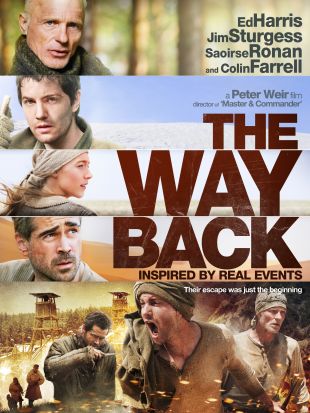
In his first feature since 2003's Master and Commander, director Peter Weir returns to old-fashioned moviemaking values with another testosterone-fueled adventure story, The Way Back. The results are not quite as impressive, and the "true" story the film is based on -- Slavomir Rawicz's wildly successful ghost-written memoir, The Long Walk -- has been pretty much debunked in recent years, but those looking for a well-acted, expertly lensed, and modestly engaging tale of man's indomitable spirit should be entertained.
Jim Sturgess (Across the Universe) stars as Janusz, a Polish military man falsely accused of spying by the Russians after the division of Poland by Stalin and Hitler. Janusz is sent to a harsh Siberian prison camp, where another prisoner, the actor Khabarov (Mark Strong, known for playing evil masterminds in Kick-Ass and Sherlock Holmes), plants the idea of escape in his head. When Janusz is sent to the mines, an American prisoner, Smith (Ed Harris), lets him know that if they don't escape, they'll be dead within a year. An international coterie of desperate men joins them, including Voss (Gustaf Skarsgård of Evil), a traumatized priest and Zoran (Dragos Bucur of Police, Adjective), an accountant who fancies himself the group's comedian. One of the genuine criminals in the camp, Valka (Colin Farrell), who's eager to escape his gambling debts, bullies his way into the group, offering the use of his treasured knife. Eventually, they come across a spirited teenage girl, Irena (Saoirse Ronan of Atonement), who is escaping her own nightmare.

The group escapes during a blizzard to cover their tracks, and soon risks freezing to death as they slowly work their way south toward Mongolia, hoping to find refuge there. With several members falling by the wayside for various reasons, they eventually make their way to the perilous Gobi Desert and the Himalayas in their tireless quest for freedom.
Russell Boyd's cinematography captures the landscape in its daunting glory, from tundra to desert to mountaintop, and he also does some fine work in close on the actors, as they grow increasingly gaunt and grizzled throughout their journey. The imagery gives a genuine sense of how grueling such a journey might have been. Burkhard Dallwitz's score is effective, in part because Weir uses it sparingly.

The international cast is generally impressive, with Farrell particularly charismatic and convincing as the stalwart crew's amoral foil, which should not come as any surprise at this point in his career. The script (by Weir and neophyte Keith R. Clarke) is workmanlike, differentiating characters just enough to make us care a bit (though the actors seem to do most of the heavy lifting in that regard), and effectively spacing out a few lighter moments throughout the tortuous trek. It's the type of film wherein one appreciates a moment of humor, even if most of those moments, as scripted, are pretty feeble. Despite these breaks, at well over two hours, the film feels a bit long, though it never feels as arduous as actually crossing the Gobi Desert on foot would have been. And one should note that the clumsy coda, a tacked-on anti-communist screed, is pure fiction in its dramatic details.
In a way, that postscript is illustrative of the film's weaknesses, and its virtues. Its story is probably not true in any of its particulars, but in its tried-and-true craftsmanship, and its cornball commitment to its old-fashioned tale, it's certain to find fans among a certain breed of filmgoer.
